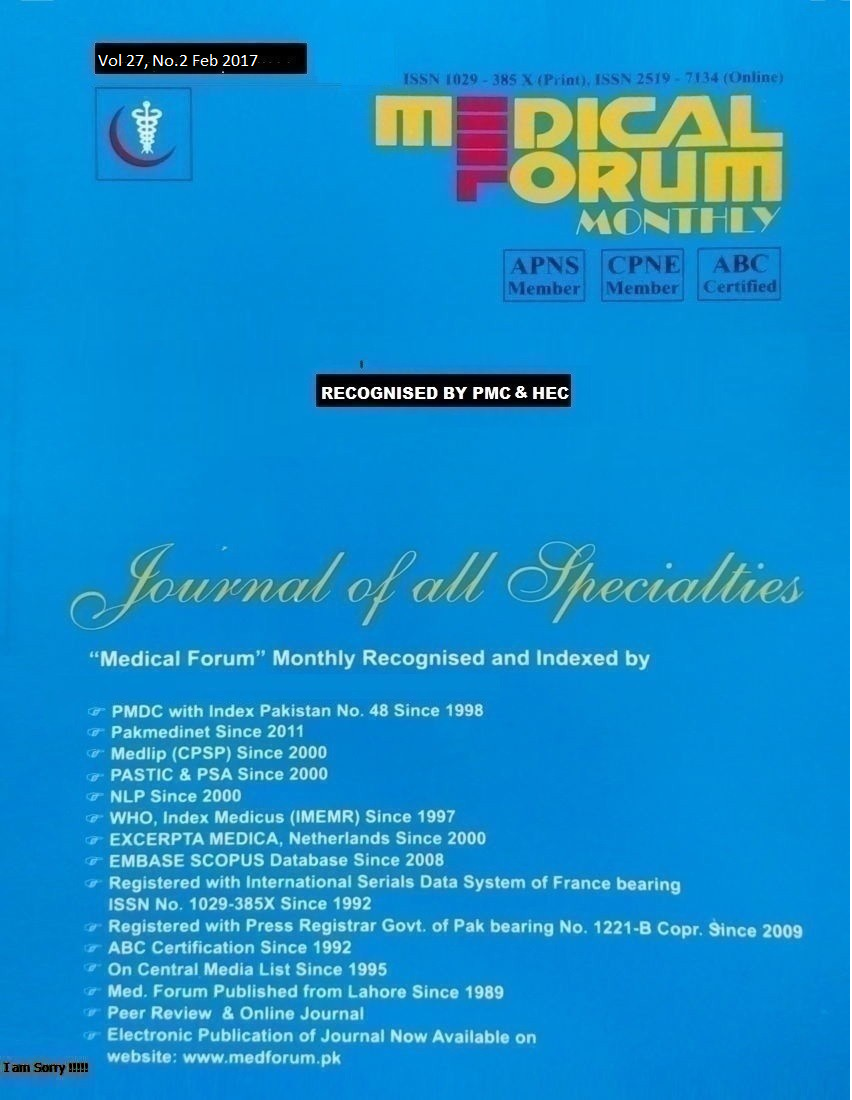
10. Assessment of Factors Associated with Practice of Breast Self-Examination in a Tertiary Care Health Setting In Karachi
1. Farhat Jaleel 2. Riffat Jaleel 3. Syeda Sakina Abidi 4. Masood Javaid
1. Assoc. Prof. of Surgery, 2. Assoc. Prof. of Obst. & Gynae, 3. PG Trainee of Surgery, 4. Asstt. Prof. of Surgery, DIMC / DUHS, Karachi.
ABSTRACT
Objectives: (1) To determine the knowledge, attitude and practice towards breast self-examination (BSE) in tertiary care health setting in Karachi. (2) To assess factors associated with practice of BSE Study Design: Cross sectional study
Place and Duration of Study: This study was carried out at the Dow University Hospital, Dow International Medical College and Dow Medical College / Dow University of Health Sciences Karachi from July to December, 2014.
Materials and Methods: Study participants were medical students, interns, residents, consultants, as well as female patients and their lady attendants visiting General Surgical Out Patient Department. A questionnaire was developed including demographic details, knowledge about BSE, attitude towards and ractice of BSE. These questionnaires were filled in by interns and residents of Department of General Surgery. Interviews were done in privacy after taking verbal consent.
Data were entered and analyzed using SPSS version 16. Categorical variables ab ut knowledge, attitude and practice are presented as frequencies. Predictors of BSE ie., age groups, level f education, occupation, income, marital status, personal history of benign breast disease and family history of breast cancer are also presented as frequencies. Their association with ever practice of BSE is determined by using hi square test.
Results: Total of 729 women were interviewed to ach eve a sample size of 500 positive responders, who had heard about BSE, which was 68.6%. Further questioning was done from these women.
Majority of participants were young, 74% being less than 30 years of age. Around half of them were graduates and 21% were post-graduates. Sixty four percent respo de ts belonged to medical profession, while 22.2% were housewives and 13.8% had other professi ns. Maj rity belonged to high income group. 61.4% were married and 11.4% had family history of breast cancer. 29% esp ndents knew correct age to start BSE. Proposed frequency was stated correctly by 49.6%, appropria e ime by 42.6%. Around 42% women said they knew how to perform and 36% could verbally explain the procedure co ec ly. Mo e than 96% women thought that BSE was useful and should be practiced. Only 39.2% women laimed hat hey practiced BSE, while just 63 of the total 500 women interviewed, were doing it regularly. Lev l of du ation, profession, income, marital status and family member with breast cancer were found to be significant factors asso iated with BSE practice.
Conclusion: Although overa awar n ss about BSE was average but correct knowledge and actual performance were poor. Medical profession, graduate level of education, handsome income, married status and family history of breast cancer were associated with BSE practice.
Key Words: Breast Self- xamination, Breast Cancer, Predictors
Citation of article: Jaleel F, Jaleel R, Abidi SS, Javaid M. Assessment of Factors Associated with Practice of Breast Self-Examination in a Tertiary Care Health Setting In Karachi. Med Forum 2016;27(2):97-40.
